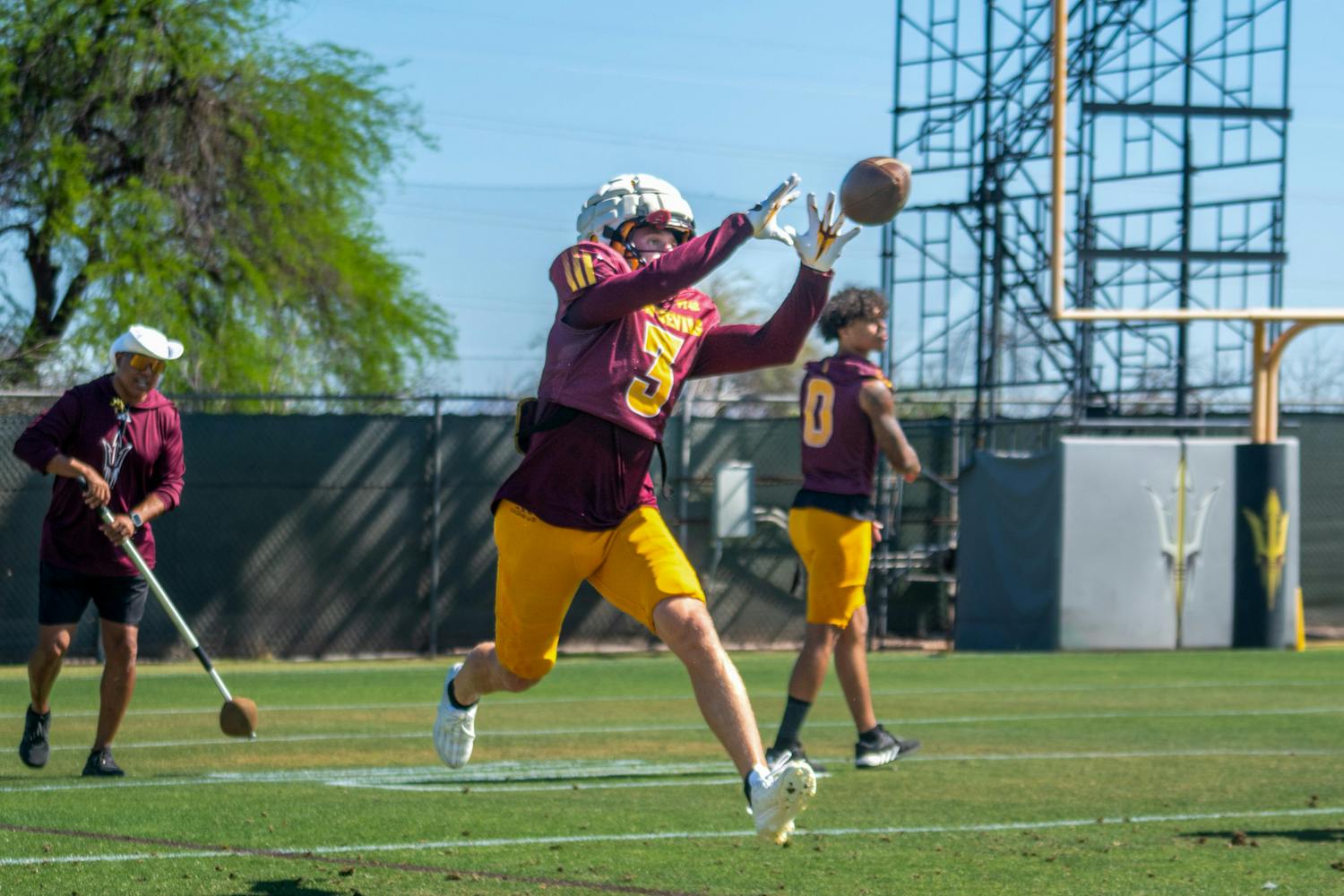 Students Nicole Lemme, Abigail Daniels and Danielle Farley sit in Hayden Lawn. The three put up feminist signs around campus. (Photo by Dominic Valente)
Students Nicole Lemme, Abigail Daniels and Danielle Farley sit in Hayden Lawn. The three put up feminist signs around campus. (Photo by Dominic Valente)Graphic design freshman Abby Daniels stood by one of the Tempe campus’s kiosks Tuesday night putting up fliers that read “We will not obey” in an attempt to cover every flier that has what she believes is a sexist message.
Earlier that day, she noticed the signs for the first time. When she stopped to take a picture of them, a student approached her and told her someone had been systematically tearing them down and that he was hoping to catch whoever was doing it.
Most fliers denounced feminists as oppressors of men’s rights and directed to the website of the Voice for Men organization.
“(Tuesday) was my first time encountering someone who was my age and college-educated, and it was disarming that they still think that way,” Daniels said.
She posted the photo in her blog and, so far, it has had almost 100 responses.
“I was boiling up slowly … and I said ‘Screw it,’ I’m going to run down to Coor, make a sign (and) cover it up,” she said.
One of the responses let her know she was not the only person who had taken action.
Anthropology freshman Danielle Farley responded and told her she had been ripping the signs since last semester.
Farley said she thinks it is her right to do so.
“I’ve done some checking into it,” she said. “I haven’t found any rules or regulations within state, city or ASU policy.”
Farley and Daniels had crossed paths before online and during some comic book conventions but are not close.
English freshman Nicole Lemme, who has been friends with Farley since high school, has been putting up her own signs to cover them as well.
Hers say “Smash the patriarchy” and “Gender rules hurt everybody,” among others.
The first time Lemme saw a poster she wrote on it, “I can’t hear you over the sound of the patriarchy.”
“I thought it was just one,” she said. “Then I started finding them everywhere.”
All three have been open to those around them about what they are doing.
“I’m not so (concerned about people knowing), because I knew what I was getting myself into when I started doing it,” Farley said. “I realize that actions have consequences, and I’m not really afraid to face them if I have to.”
The signs are inaccurate and offensive, Lemme said.
“There’s a lot of (rape) victim-blaming that gets put up,” she said. “As a feminist, I think it’s not factual, and it’s contributing to stereotypes.”
Farley said there is a lot of support for what they are doing.
A photo of one of her responses ended up in someone else’s blog once.
Almost a dozen people have decided to tear them down whenever they see a poster, Farley said. Some of them are men who disagree with the message.
Lemme was part of a feminist union on campus last semester, but her schedule did not allow her to join this semester.
Discussing feminism would not be enough to combat the signs, she said.
“I consider (tearing them or covering them) an act of symbolic speech,” she said. “While it’s free speech to put them up, it’s also free speech to tear them down.”
Law professor James Weinstein, who specializes in freedom of speech, said the first amendment only applies to government.
“If somebody from the school administration were to rip them off, it would violate the First Amendment,” he said. “Then it would be illegal.”
Taking down the fliers is not freedom of speech, Weinstein said.
“It’s not their right of free speech to deface somebody else’s poster, if the poster is displayed where it has a right to be,” he said. “I think it violates some rule of the University, but that I don’t know.”
According to an October 2011 State Press article, there is no University policy against tearing down signs or covering them.
They would be exercising their rights if they displayed their message side by side with the signs they defaced, Weinstein said.
“It’s the antithesis of free speech,” he said. “To stop the message because they disagree with it is the opposite of free speech.”
Daniels said they do not plan to form a feminist group.
“We have a loose network of people, but there’s no official group,” she said.
Feminism is already a disadvantaged group because people have preconceived notions of them being man-hating lesbians, Lemme said.
“They think women hate men and feminism is about enslaving them,” she said. “That is just not true.”
Feminism is not about hating men, as the signs portray it, Daniels said.
"We want people to know we don’t hate men,” she said. “We just want to have the equal rights as them. We don’t want more rights.”
Daniels follows many blogs that deal with social justice but had never done anything like this until Tuesday.
She said people might think whoever is putting up the signs just wants to have a discussion.
“They can discuss all they want, but not based on lies,” she said.
Farley once wrote a refutation for every statistic that was posted on one of the signs.
“Every single one was falsely attributed,” she said. “They also came from very biased sources.”
Numbers and facts are power, but these were not correct, Farley said.
Lemme said the signs they put up could be beneficial for other students.
“The more we put up posters that show the truth, the more it will help,” she said. The Voice for Men signs are not illegal because they do not contain hate speech, Lemme said.
“I don’t think this is hate speech,” she said. “But one step further, and it would be. It’s almost there.”
Weinstein said there is no set definition of hate speech, but it is not an exception of the First Amendment. The exceptions include obscenities and fighting words.
“There’s a right to engage in hate speech,” he said. “Whether the University condemns it is different. That I don’t know.”
If the signs were construed as hate speech, the students might be able to make ASU take them down, but it’s unlikely since it’s a public forum, Weinstein said.
Daniels, Farley and Lemme said that if the situation arose, they would be willing to talk to whoever is behind the posters.
Reach the reporter at dpbaltaz@asu.edu or follow her on Twitter @dpalomabp




